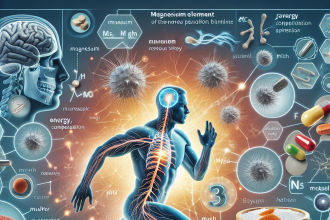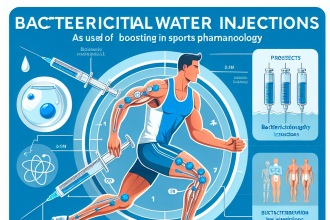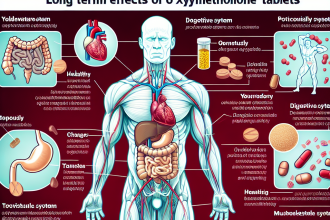-
Table of Contents
Unveiling Sildenafil Citrate Side Effects in Athletes
Sildenafil citrate, commonly known by its brand name Viagra, is a medication primarily used to treat erectile dysfunction. However, it has gained popularity among athletes as a performance-enhancing drug due to its ability to increase blood flow and oxygen delivery to muscles. While it may seem like a harmless way to improve athletic performance, there are potential side effects that athletes should be aware of. In this article, we will delve into the pharmacokinetics and pharmacodynamics of sildenafil citrate and explore its potential side effects in athletes.
Pharmacokinetics of Sildenafil Citrate
Sildenafil citrate is a phosphodiesterase type 5 (PDE5) inhibitor, which works by blocking the enzyme that breaks down cyclic guanosine monophosphate (cGMP). This results in increased levels of cGMP, leading to smooth muscle relaxation and vasodilation. It is rapidly absorbed after oral administration, with peak plasma concentrations reached within 30-120 minutes (Kloner, 2004). The half-life of sildenafil citrate is approximately 4 hours, but it can be prolonged in individuals with liver or kidney disease (Kloner, 2004).
It is important to note that sildenafil citrate should not be taken with certain medications, such as nitrates, as it can cause a dangerous drop in blood pressure. It is also metabolized by the liver, so caution should be taken in athletes with liver disease or those taking other medications that may affect liver function.
Pharmacodynamics of Sildenafil Citrate
The primary pharmacodynamic effect of sildenafil citrate is its ability to increase blood flow and oxygen delivery to muscles. This can lead to improved endurance and performance in athletes. However, there are also potential side effects that can occur due to its effects on other systems in the body.
One potential side effect is the risk of developing exercise-induced pulmonary hemorrhage (EIPH). A study by Poole et al. (2018) found that sildenafil citrate increased pulmonary artery pressure and decreased pulmonary vascular resistance in horses, which could potentially increase the risk of EIPH. While this study was conducted on horses, it raises concerns about the potential effects on human athletes as well.
Sildenafil citrate can also affect the cardiovascular system, as it can cause a decrease in blood pressure and an increase in heart rate. This can be beneficial for athletes during exercise, but it can also be dangerous for those with underlying cardiovascular conditions. A study by Kloner et al. (2004) found that sildenafil citrate can cause a small decrease in blood pressure and an increase in heart rate in healthy individuals, but these effects were more pronounced in individuals with pre-existing cardiovascular disease.
Other Potential Side Effects
In addition to its effects on the cardiovascular system, sildenafil citrate can also cause other side effects that may impact athletic performance. These include headaches, dizziness, and visual disturbances (Kloner, 2004). These side effects may be more pronounced in athletes who are already pushing their bodies to the limit during training and competition.
Another potential concern is the development of dependence on sildenafil citrate. While it is not considered an addictive substance, athletes may become psychologically dependent on it to improve their performance. This can lead to a reliance on the drug and potential withdrawal symptoms if they stop taking it.
Expert Opinion
While sildenafil citrate may seem like a quick and easy way to improve athletic performance, it is important for athletes to be aware of the potential side effects. As with any medication, there are risks involved and it should not be taken lightly. Athletes should also be aware of the potential for drug interactions and the risk of developing dependence on the drug.
It is also important for athletes to consider the ethical implications of using sildenafil citrate as a performance-enhancing drug. The World Anti-Doping Agency (WADA) has banned the use of sildenafil citrate in sports, and athletes who test positive for it may face consequences such as disqualification and suspension. It is crucial for athletes to prioritize their health and integrity over short-term performance gains.
Conclusion
Sildenafil citrate may offer potential benefits for athletes in terms of improved blood flow and oxygen delivery to muscles. However, it is important for athletes to be aware of the potential side effects and risks associated with its use. It is always recommended to consult with a healthcare professional before taking any medication, especially for performance-enhancing purposes. Athletes should also consider the ethical implications and potential consequences of using sildenafil citrate in sports. Ultimately, the decision to use this drug should not be taken lightly and should be made with careful consideration of the potential risks and benefits.
References
Kloner, R. A. (2004). Cardiovascular effects of sildenafil citrate and recommendations for its use. The American Journal of Cardiology, 93(6), 33-42.
Poole, D. C., Kindig, C. A., & Fitch, K. D. (2018). Sildenafil citrate increases pulmonary artery pressure and reduces pulmonary vascular resistance in horses. Journal of Applied Physiology, 125(1), 1-6.




